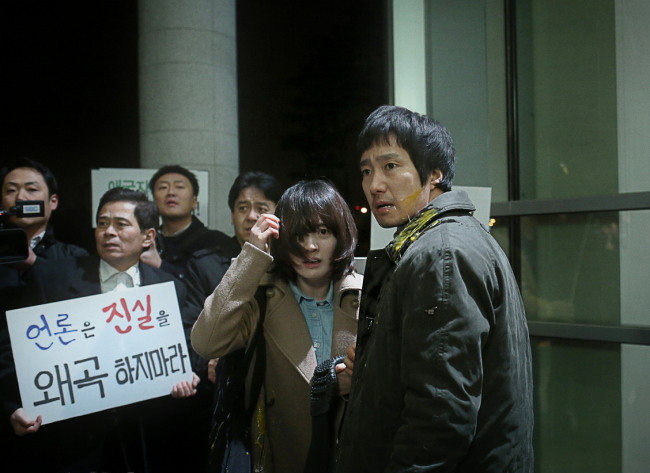[Herald Review] Exploring blurred line between truth and national interest
‘Whistle-Blower,’ centering on a stem cell scandal in 2005, depicts journalist’s endeavor in search for truth
By Korea HeraldPublished : Sept. 28, 2014 - 20:31
Which comes first, truth or national interest?
This question is asked several times in the film “Whistle-Blower” by director Yim Soon-rye (“The Best Moment of Our Lives,” “Southbound”).
“The truth,” the TV producer of an investigative journalism program answers in less than a second. “Because truth ultimately contributes to the national interest.”
But what if the truth is ugly, unwanted or tarnishes the national image? In that case, how many people would give the same answer without a second thought?
“Whistle-Blower,” based on a real-life scandal in 2005, in which Korean scientist Hwang Woo-suk was found to have published groundbreaking research on stem cells based on false data and fabricated evidence, probes into this question.
“If the film was stressing whether the stem cell (discoveries) were real or not, I would not have decided to make this sensitive film,” said director Yim during a press premiere. “The film is the story of a real journalist striving to uncover the truth.”
This question is asked several times in the film “Whistle-Blower” by director Yim Soon-rye (“The Best Moment of Our Lives,” “Southbound”).
“The truth,” the TV producer of an investigative journalism program answers in less than a second. “Because truth ultimately contributes to the national interest.”
But what if the truth is ugly, unwanted or tarnishes the national image? In that case, how many people would give the same answer without a second thought?
“Whistle-Blower,” based on a real-life scandal in 2005, in which Korean scientist Hwang Woo-suk was found to have published groundbreaking research on stem cells based on false data and fabricated evidence, probes into this question.
“If the film was stressing whether the stem cell (discoveries) were real or not, I would not have decided to make this sensitive film,” said director Yim during a press premiere. “The film is the story of a real journalist striving to uncover the truth.”

The film specifies in the very beginning that, although it is inspired by a real event, it is fictionalized. Nevertheless, it is hard to separate Hwang Woo-suk and MBC’s investigative program “PD’s Notebook,” which uncovered the scandal, from the film’s fictional character Lee Jang-hwan (Lee Geung-young) and “PD Chase.”
Yoon Min-chul (Park Hae-il) is the main producer of the investigative journalism program “PD Chase.”
Yoon’s investigation begins when he receives a call from an informant confessing that research by Dr. Lee Jang-hwan, a feted national figure on account of his stem cell research, is based on fabricated data.
The informant, identified as Shim Min-ho (Yoo Yeon-seok), decides to expose Lee’s misconduct after agonizing over the decision while working as a researcher in Lee’s lab.
“But I don’t have any hard evidence,” says Shim to Yoon. “Will you still believe me?”
With a firm agreement, Yoon jumps into the case, not realizing harsh circumstances await him and his team.
As Yoon arrives closer to the truth of the case, he is faced with fierce criticism not only from the public, which pinned high hopes on Lee’s research, but also from other media outlets calling Yoon a traitor for exposing the national patriot Lee.
Yoon, fighting a lonely battle, meets a dead end when his company decides not to air the program. It is then that Yoon cries out, “I thought if we told the truth, people would be on our side.”
“Searching for truth is not important. What is important is that people are already believing it,” says a high official at Yoon’s broadcasting company ordering Yoon to stop working on the story.
Yoon, for the first time, is scared of the public, who have blind faith in Lee and the wider media.
Viewers are invited to ask how far Yoon would go to expose the truth, and wonder whether the truth can triumph in this world, in the face of so many interested parties ― from the government protecting its national interest to the company defending its economic profits and most of all, the public keen to hold onto its hopes.
In many cases, people want to know the truth and they expect journalists to tell the truth. But as described in the film, approaching the truth is not always simple. It is not only affected by outer forces, but also, people tend to believe what they want to, even when it is false.
In these circumstances, the film poses a question to the audiences What is the role of journalism? Journalism’s role, according to Yoon, is to give the public an opportunity to decide whether something is true or not.
Nevertheless, the film not only focuses on the roles of journalism, but also on people’s role and their attitudes towards truth and justice ― whether they are ready to hear the truth.
Although the two-hour long film is based on a serious scientific subject, the film is surprisingly easy watching, and even humorous at times. Yim’s unique warm style and humanity permeates the film, giving a tranquil opportunity for viewers to question their role in society.
“Whistle-Blower” opens in theaters this Thursday.
By Ahn Sung-mi (sahn@heraldcorp.com)
-
Articles by Korea Herald







![[KH Explains] Hyundai's full hybrid edge to pay off amid slow transition to pure EVs](http://res.heraldm.com/phpwas/restmb_idxmake.php?idx=644&simg=/content/image/2024/04/18/20240418050645_0.jpg&u=20240419100350)







![[From the Scene] Monks, Buddhists hail return of remains of Buddhas](http://res.heraldm.com/phpwas/restmb_idxmake.php?idx=652&simg=/content/image/2024/04/19/20240419050617_0.jpg&u=20240419175937)

![[KH Explains] Hyundai's full hybrid edge to pay off amid slow transition to pure EVs](http://res.heraldm.com/phpwas/restmb_idxmake.php?idx=652&simg=/content/image/2024/04/18/20240418050645_0.jpg&u=20240419100350)

![[Today’s K-pop] Illit drops debut single remix](http://res.heraldm.com/phpwas/restmb_idxmake.php?idx=642&simg=/content/image/2024/04/19/20240419050612_0.jpg&u=)